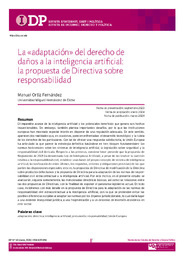Por favor, use este identificador para citar o enlazar este ítem:
https://hdl.handle.net/11000/31633Registro completo de metadatos
| Campo DC | Valor | Lengua/Idioma |
|---|---|---|
| dc.contributor.author | Ortiz Fernández, Manuel | - |
| dc.contributor.other | Departamentos de la UMH::Ciencia Jurídica | es_ES |
| dc.date.accessioned | 2024-03-01T11:24:57Z | - |
| dc.date.available | 2024-03-01T11:24:57Z | - |
| dc.date.created | 2024-03 | - |
| dc.identifier.citation | Revista de los Estudios de Derecho y Ciencia Política N.º 40 (marzo, 2024) | es_ES |
| dc.identifier.issn | 1699-8154 | - |
| dc.identifier.uri | https://hdl.handle.net/11000/31633 | - |
| dc.description.abstract | El imparable avance de la inteligencia artificial y los potenciales beneficios que genera son hechos incuestionables. Sin embargo, también plantea importantes desafíos, por lo que las instituciones europeas han mostrado especial interés en disponer de una regulación adecuada. En este sentido, aparecen dos realidades que, en ocasiones, parecen enfrentadas: el desarrollo tecnológico y la tutela de los derechos de los particulares. Con tal de ofrecer una respuesta satisfactoria, la Unión Europea ha articulado la que parece la estrategia definitiva basándose en tres bloques fundamentales: las normas horizontales sobre los sistemas de inteligencia artificial, la legislación sobre seguridad y la responsabilidad civil derivada. Respecto a las primeras, conviene tener presente que la propuesta de Reglamento de 2021 (la denominada Ley de Inteligencia Artificial), a pesar de no resolver la cuestión relativa a la responsabilidad civil, establece unas bases (el propio concepto de sistema de inteligencia artificial, la clasificación de estos últimos, los requisitos, criterios y obligaciones previstas) de las que parten las disposiciones especiales; esto es, la propuesta de Directiva de modificación de la Directiva sobre productos defectuosos y la propuesta de Directiva para la adaptación de las normas de responsabilidad civil extracontractual a la inteligencia artificial. Por este motivo, en el presente estudio se analizarán, siquiera someramente, las mencionadas directrices básicas, así como las relaciones entre las dos propuestas de Directivas, con la finalidad de exponer el panorama legislativo actual. En todo caso, incidiremos con más detalle en la propuesta de Directiva para la adaptación de las normas de responsabilidad civil extracontractual a la inteligencia artificial, con la que se pretenden evitar las posibles diferencias surgidas al adaptar las normas por los órganos jurisdiccionales, lo cual daría lugar a una evidente inseguridad jurídica, a una fragmentación y a un descenso de inversión económica en este sector | es_ES |
| dc.description.abstract | The unstoppable spreading of artificial intelligence and the potential benefits it generates are unquestionable facts. However, it also poses significant challenges, so European institutions have shown special interest in having adequate regulation. In this sense, there are two realities that sometimes appear to be confronted: technological development and the protection of the rights of individuals. In order to provide a satisfactory response, the European Union has articulated what appears to be the definitive strategy based on three fundamental blocks: the horizontal rules on artificial intelligence systems, security legislation and the derived civil liability. Regarding the first two, it should be noted that the proposed Act of 2021 (the so-called Artificial intelligence act), despite not resolving the civil liability issue, lays a foundation (the concept of an artificial intelligence system itself, the classification of the latter, the requirements, criteria and obligations derived) from which special provisions arise; this is, the proposed Directive on the modification of the Directive on defective products and the proposed Directive for the adaptation of extra-contractual civil liability rules to artificial intelligence. For this reason, the aforementioned basic guidelines, as well as the relations between the two proposals of Directives, will be analysed in this study, even in a shallow manner, in order to expose the current legislative frame. In any case, we will affect in more detail the proposal of the Directive for the adaptation of extra-contractual civil liability rules to artificial intelligence, with which we aim to avoid the possible differences arising when the jurisdictional bodies adapt the rules, which would result in an evident legal insecurity, in fragmentation and a decrease in economic investment in this sector | es_ES |
| dc.format | application/pdf | es_ES |
| dc.format.extent | 12 | es_ES |
| dc.language.iso | spa | es_ES |
| dc.publisher | Universitat Oberta de Catalunya | es_ES |
| dc.rights | info:eu-repo/semantics/openAccess | es_ES |
| dc.rights | Attribution-NonCommercial-NoDerivatives 4.0 Internacional | * |
| dc.rights.uri | http://creativecommons.org/licenses/by-nc-nd/4.0/ | * |
| dc.subject | adaptación | es_ES |
| dc.subject | directiva | es_ES |
| dc.subject | inteligencia artificial | es_ES |
| dc.subject | presunción | es_ES |
| dc.subject | responsabilidad | es_ES |
| dc.subject | Unión Europea | es_ES |
| dc.subject | adaptation | es_ES |
| dc.subject | directive | es_ES |
| dc.subject | artificial intelligence | es_ES |
| dc.subject | presumption | es_ES |
| dc.subject | liability | es_ES |
| dc.subject | European Union | es_ES |
| dc.subject | artificial intelligence | es_ES |
| dc.subject | presumption | es_ES |
| dc.subject | European Union | es_ES |
| dc.subject.other | CDU::3 - Ciencias sociales::34 - Derecho | es_ES |
| dc.title | La «adaptación» del derecho de daños a la inteligencia artificial: la propuesta de Directiva sobre responsabilidad | es_ES |
| dc.title.alternative | The “adaptation” of the right to damages to artificial intelligence: the proposed Civil liability directive | es_ES |
| dc.type | info:eu-repo/semantics/article | es_ES |
| dc.relation.publisherversion | https://doi.org/10.7238/idp.v0i40.419696 | es_ES |

Ver/Abrir:
6-419696-Texto del artículo-627864-2-10-20240227 (1).pdf
336,34 kB
Adobe PDF
Compartir:
 La licencia se describe como: Atribución-NonComercial-NoDerivada 4.0 Internacional.
La licencia se describe como: Atribución-NonComercial-NoDerivada 4.0 Internacional.
.png)